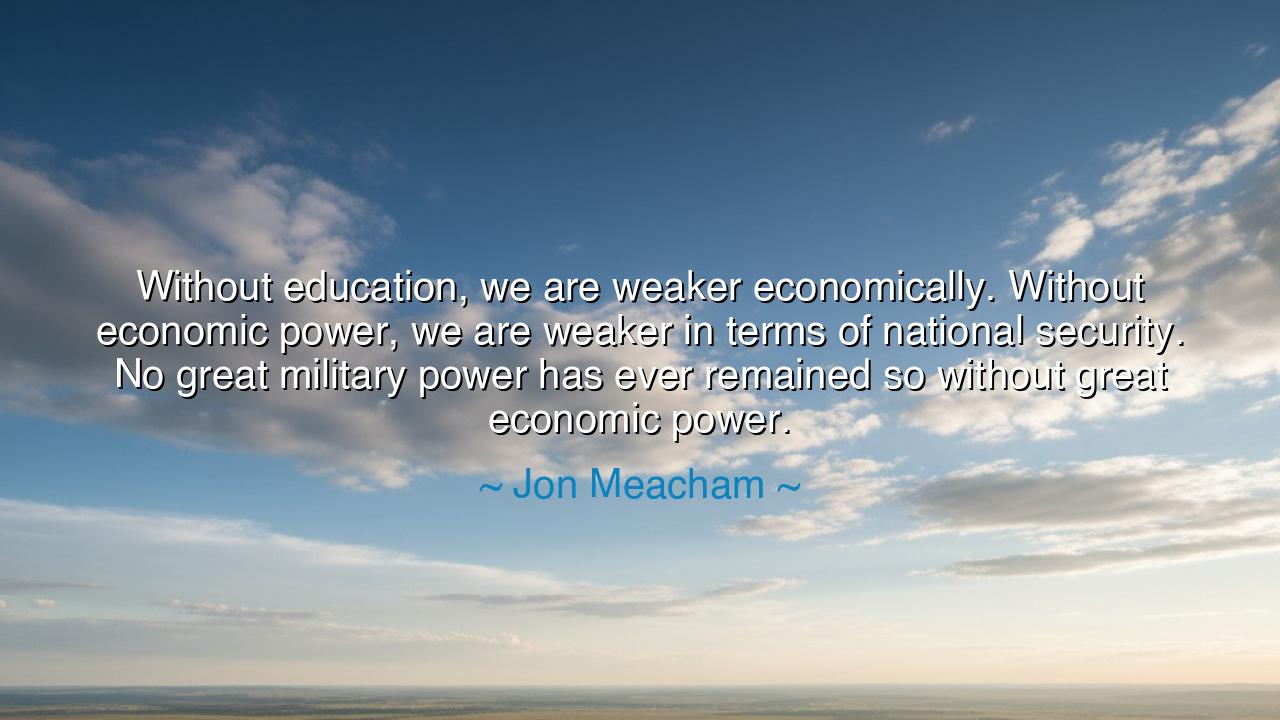
Without education, we are weaker economically. Without economic
Without education, we are weaker economically. Without economic power, we are weaker in terms of national security. No great military power has ever remained so without great economic power.






“Without education, we are weaker economically. Without economic power, we are weaker in terms of national security. No great military power has ever remained so without great economic power.” Thus spoke Jon Meacham, a historian and sage of modern times, whose words remind us of a truth as old as civilization itself — that knowledge is the foundation of strength, and that without the enlightenment of the mind, no fortress, no army, no empire can stand for long. In these lines, Meacham weaves together the fates of education, economy, and security — three pillars upon which the destiny of nations rests. He warns that ignorance breeds poverty, poverty breeds weakness, and weakness invites peril.
The ancients understood this truth well. The philosophers of Greece taught that the mind is the beginning of all power, and that a people without wisdom soon falls into chaos. In the East, sages declared that a ruler’s might depends not on the sword, but on the virtue and knowledge of his people. Even in Rome, when legions stretched from Britain to Egypt, it was the Roman system of governance, trade, and law — born from learning — that sustained the empire far longer than any conquest. Meacham, inheriting the insight of these civilizations, reminds us that the strength of a nation begins not in its armies, but in its schools, its minds, and its moral imagination.
Consider, for example, the story of postwar Japan. In the ashes of defeat after the Second World War, Japan had lost its empire, its military, and much of its infrastructure. Yet it still possessed one unbreakable weapon — its devotion to education. While the nation could not rebuild its armies, it rebuilt its schools, its universities, and its industries of innovation. Within a generation, Japan rose from ruin to become an economic titan, its strength derived not from war but from the intelligence and discipline of its people. Through knowledge, it regained power; through education, it forged security. It was not steel or fire that redeemed it, but the power of the mind.
History, too, offers the opposite lesson — that when nations neglect learning, they sow the seeds of their own decline. The Ottoman Empire, once the center of brilliance and trade, stagnated when it turned away from scientific inquiry and shut its doors to new knowledge. Its armies remained mighty for a time, but its power slowly waned, for it no longer cultivated the wisdom to adapt. The same was true of imperial Spain, which grew rich on conquest but failed to invest in its people’s education and industry. Its wealth drained away like sand through fingers, and its empire, once vast, collapsed under the weight of ignorance and debt. Meacham’s warning thus resounds through time: economic strength is not born of greed, but of knowledge — and without it, even the mightiest fall.
Education, in Meacham’s vision, is not merely the study of facts; it is the training of free minds. It is what allows citizens to innovate, to question, to build. When people are educated, they create wealth not only in currency, but in ideas — inventions, systems, and wisdom that sustain nations through ages of change. From that wealth springs economic power, the lifeblood of progress, the means by which a society feeds, defends, and renews itself. And from that power arises national security, not through fear, but through stability. For no fortress can stand on empty coffers, and no army can march without the industries and intellect that sustain it.
The ancients would have called this the chain of strength — the unbroken link between the mind, the marketplace, and the might of nations. Break one link, and all are lost. The wise ruler, therefore, invests first not in armies, but in teachers; not in weapons, but in minds. For knowledge multiplies itself — one enlightened child can create a future that an entire army cannot protect. It is through the scholar, the inventor, the craftsman, and the teacher that nations achieve enduring greatness. The sword may win battles, but only wisdom wins peace.
So, my friend, let this be your lesson: value learning as the truest form of power. Study, question, and create — not only for your own sake, but for the strength of your people. Remember that ignorance is the enemy of prosperity, and education is the seed of endurance. A nation that neglects its schools builds its future on sand; a nation that honors them builds upon stone. If you would secure your homeland, strengthen its minds; if you would preserve its freedom, enlighten its citizens.
For as Jon Meacham teaches, the sword rusts, the fortress falls, and wealth fades — but knowledge endures, renewing all things. It is the quiet fire that forges both prosperity and peace. Thus, let every generation be taught this truth: that the truest defense of a nation lies not in its weapons, but in its wisdom; not in its armies, but in its education. For when the people think clearly and act justly, no darkness — whether of poverty, tyranny, or war — can ever prevail.






AAdministratorAdministrator
Welcome, honored guests. Please leave a comment, we will respond soon